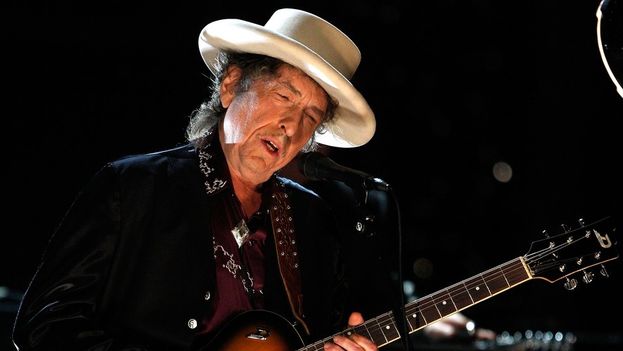
![]() 14ymedio, Ernesto Santana, Havana, 15 October 2016 – Like almost everything related to him, the fact that Bob Dylan received the Nobel Prize in Literature this Thursday has raised a media dust storm. Some celebrate, others criticize, some mock. The troubadour, regardless of the uproar, continues on his way.
14ymedio, Ernesto Santana, Havana, 15 October 2016 – Like almost everything related to him, the fact that Bob Dylan received the Nobel Prize in Literature this Thursday has raised a media dust storm. Some celebrate, others criticize, some mock. The troubadour, regardless of the uproar, continues on his way.
On behalf of the Swedish Academy, Sara Danius said that the prize was awarded for “for having created new poetic expressions within the great American song tradition,” adding, “Bob Dylan is a great poet. As simple as that. A great poet in the great tradition of English, Milton and Blake forward. ”
A few have complained that the Nobel should have gone to Philip Roth or Don DeLillo, or the novelist Haruki Murakami or Syrian poet Adonis. But the choice of the American singer-songwriter has been a surprise, although nobody was surprised that he had been nominated for years.
Although he published Tarantula and a part of his autobiography, Dylan is not a prose writer. He is a poet with a guitar. Such diverse writers as Salman Rushdie and Marguerite Yourcenar have always considered him a great poet.
His importance in the musical world has been greatly talked about. His invention of a new type of song, his work as a precursor of rap and hip-hop, his weight in the evolution of rock, his masterful incorporation of various musical genres to form a vast and unclassifiable work. They say he himself complained that “there is no Nobel Prize for music.”
The musician Robert Allen Zimmerman started calling himself Bob Dylan because of his early devotion to the Welsh poet Dylan Thomas and, as he himself confessed, Jack Kerouac’s poetry inspired him to enter the world of trova.
It was not only the author of On The Road that inspired him, but also other greats of the Beat Generation, such as Neal Cassady, William Burroughs and Allen Ginsberg – the latter of whom accompanied him on tour and at concerts – and who ended up seeing him not as a disciple, but as the generational spokesperson for the turbulent sixties.
Not only were many eminent poets impressed with the deep epic breath or lyrical themes such as Like A Rolling Stone, All Along The Watchtower and Knockin ‘On Heaven’s Door. For successive generations of songwriters and countless mass audiences, Dylan has been the revealer of unprecedented images, the wizard of golden words.
He has often been compared with Leonard Cohen, recognized as a good storyteller and poet, besides being a great lyricist, but there is significant distance between the scope of the Canadian artist and the American one, beyond the greater quality as a musician of the latter. It is no wonder that Dylan has been the standard raised in so many battles – artistic and otherwise – of the second half of the 20th century, a battle waged with Cohen who has managed to be a less tempting diamond.
Those who would like a Nobelist with more published works don’t acknowledge as such the books collecting the lyrics of Dylan’s songs which generally also appear on the covers of his albums. His lyrics have generated an entire literature – not to mention the writers influenced by them – about their significance, use of language, probable ideology, etc., along with the abundant academic studies of his poetry.
Bob Dylan has been described as a prophet of a new era, social leader, spokesman for the dispossessed, folk idol, rock superstar, example of committed artist, great balladeer of love, counterculture guide and, finally, among other things, as king of the protest song.
He has always been more than a musician, filmmaker or painter, writer or revolutionary of art: a poet in the broadest sense of the word. Free artist par excellence who did not fall into pathos or ridicule, like many during the Cold War, nor did he accept the warmongering violence of revolutionary bullying, and he was not fooled by reactionaries nor seduced by progressives.
Those who venerate the New Cuban Trova and the new Latin American song know that its principal singers owe him an incalculable debt, but they forget that, unlike most of them, Dylan never compromised with tyrants of any stripe. For him, more important than left or right are up and down.
Ultimately, the decisive factor is that Bob Dylan doesn’t need a Nobel Prize. He has several great prizes already, some of which he didn’t even go to collect. Nobody thinks very much about them when they speak of him.
In the European Middle Ages, the troubadours carried the mastersinger, their body of lyric and epic work, through a world without borders, wandering. There is no better way to speak of the work of this man who, although he doesn’t need the money from his concerts, continues on the road.
Although outside the United States his concerts represent a major cultural event, within the country you are as likely to see him at a simple county fair, on a college campus or on an Indian reservation, although he doesn’t go out into public very much. It is as if he would not let his guitar languish for any prize. As if he would not surrender the endless route of the eternal bards.
“He not busy being born is busy dying,” he sings on that endless road that is his only real prize.
